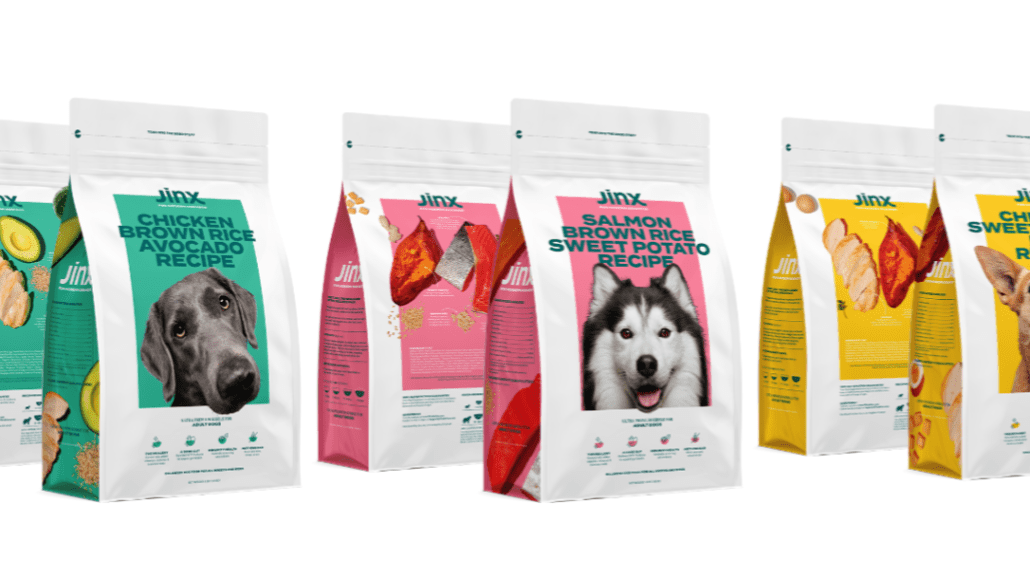Save 50% on a 3-month Digiday+ membership. Ends Dec 5.

Jinx, a new direct-to-consumer pet-care wellness company, wants to be a one-stop-shop for dog owners. Set to launch in January 2020, the new company was founded by three former Casper execs who believe that millennial and Gen Z pet owners want to shop online for their pet-care needs.
E-commerce pet care is already a well-established category, but Jinx is aiming to stand out with what it believes to be a new approach — a single brand that sells a whole host of products for pet wellness. Initially, the company will sell kibble and treats, but has plans to add more dog food options as well as “technology-enabled pantry devices” next year.
“Instead of shopping across brands, imagine a single brand that covers all categories and has designed its products to complement one another to serve the ultimate modern dog,” said CEO Terri Rockovich. The company hopes to provide owners with “an aspirational, but attainable and relatable pet wellness brand.”
Jinx is backed by venture capital firms like Initialized Capital, Align Ventures, Brand Foundry and Wheelhouse Group, which between them have backed DTC brands including Allbirds, Billie, Bonobos, Harry’s, Peloton and Warby Parker. Celebrities including Nas, Halsey, Will Smith and Lilly Singh are also investors.
Rockovich, along with co-founders Sameer Mehta and Michael Kim, see their experience working for digitally native brands like Casper as an advantage because of their understanding of how to market. Consumers, said Rockovich, inherently put more trust in marketing from DTC companies.
“For the Millennial and Gen Z audience, direct-to-consumer marketing holds substantially more appeal over traditional marketing models as they speak to their priorities: ease, convenience, transparency, controlled costs, authenticity and a seamless shopping experience,” said Rockovich.
That’s what Jinx is looking to be for the growing number of pet owners who want to shop online for their pet products. In 2018, 21% of pet food was purchased online versus 12% in 2017, according to Nielsen, which also found that 25% of consumers were more likely to purchase pet food online. Per Nielsen, U.S. consumers spent $33 million on premium pet food with ingredients like beets, carrots and sweet potato.
Ad position: web_incontent_pos1
“Pet care hasn’t gone DTC just yet, but it’s well on its way,” said Ted Nelson, CEO and co-founder of strategic creative agency Mechanica, of Jinx’s aim to make pet care DTC. “Pet relationships are about as personal as brand and product relationships get, which means it’s ripe for DTC and the ability to personalize and add a level of on-demand convenience.”
But even if millennial and Gen Z pet owners want to shop online for their pet food, that doesn’t automatically give Jinx a heads up, said Allen Adamson, brand consultant and co-founder of Metaforce. “The marketplace is exploding with choices and they all pitch a similar game: Organic better food for your dog that will help them live longer,” said Adamson, adding that many of these brands use online pet care retailer Chewy.com for e-commerce. “The market has been fragmented for years but the barrier to entry through DTC is lower than ever before, so they can try it, but their success will depend on how creative and differentiated they will be.”
Part of that push for differentiation will be in the marketing, which will launch next year, per Rockovich. The company will use what it calls a “direct-to-dog” marketing approach to do just that with plans for an out-of-home campaign and experiential events. It’s unclear exactly what the company means by “direct-to-dog” as it declined to share more specifics into how it will market next year.
More in Marketing

Ulta, Best Buy and Adidas dominate AI holiday shopping mentions
The brands that are seeing the biggest boost from this shift in consumer behavior are some of the biggest retailers.

U.K. retailer Boots leads brand efforts to invest in ad creative’s data layer
For media dollars to make an impact, brands need ad creative that actually hits. More CMOs are investing in pre- and post-flight measurement.
Ad position: web_bfu




